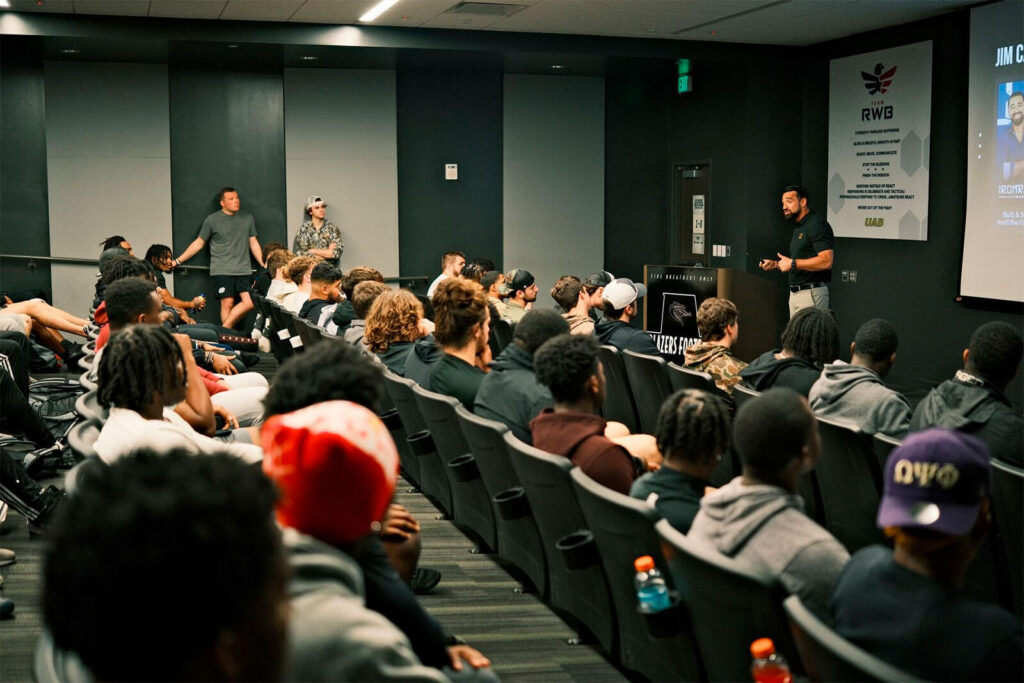
As Congress resumes from summer recess, Athletes.org (AO) is emphasizing the biggest threat facing both college athletes and college athletics as a whole: the SCORE Act. This bill, written almost exclusively based on input from and the wishes of the NCAA and Power 4 conferences, continues to move forward without addressing the concerns that have been raised over and over by college athletes and Athletes.org. Athletes.org stresses that this bill, especially the proposed antitrust exemptions for the NCAA, a serial antitrust violator, would be devastating to the future of college sports.
As the Executive Committee from Athletes.org has previously shared, the SCORE Act threatens to roll back the progress athletes have fought for over the past century, would limit financial opportunities for every college athlete, and would also completely strip certain rights from athletes. The ways the SCORE Act would strip or severely limit college athletes’ rights include the following:
- Unilaterally limiting athletes’ earning potential by unfairly monitoring and subjectively restricting third party NIL payments, once again taking away the right to freely monetize and control their NIL like every other college student and every other citizen in the US.
- Limiting payments from schools to athletes through a salary cap that has not been negotiated by the affected college athletes and that would limit opportunities for better terms in the future.
- Once again placing restrictions on college athletes’ right to transfer and play at new schools, a right that has been validated by a federal court finding previous NCAA restrictions violate antitrust law.
- Prohibiting college athletes from being considered employees and receiving protection from federal employment laws.
“The SCORE Act continues to be a massive threat to college athletics, one that the NCAA continues to push for, and we at AO are reminding everyone who has a stake in this multi-billion dollar industry just how bad this would be,” said Brandon Copeland, co-founder of Athletes.org. “No other model in sports – professional or otherwise – limits the rights of athletes or grants unchecked power to governing bodies the way the SCORE Act would for the NCAA
and its member schools. We cannot allow this devastating proposed bill to advance. On behalf of athletes everywhere, we urge Congress to reject this bill and support legislation that enables athletes to be fairly represented by a players association: a model of partnership that has worked incredibly well already at the pro level to create the most successful, functional and sustainable sports industries in the world.”
“College athletes deserve more than the SCORE Act will give them. They deserve real health benefits, academic opportunities and compensation for their achievements athletically – but more than that, they deserve to be represented by their own, chosen players association,” Copeland continued. “The only way forward is not this bill, but a collective bargaining agreement which would rewrite the broken system the NCAA and its member institutions are desperate to keep. Passing this act without the athletes formally weighing in on these monumental decisions is a mistake that will impact them and this industry for decades to come and is extremely short-sighted for all.”
Issues with the SCORE Act:
- Who it Protects: The bill primarily supports, reflects, and protects the interests of those who have created the problems in college athletics: the leaders of the conferences, institutions and the NCAA – and does not take into consideration any input from the athletes themselves.
- When read together, Sections 6 and 7 authorize interstate intercollegiate athletic associations (such as the NCAA, or other governing bodies) to “establish and enforce rules” governing athlete transfers, athlete compensation, athlete eligibility, and playing seasons without fear of antitrust compliance or challenges resulting in administrators having complete and total control over an athlete’s academic and athletic career and the compensation they can earn from that career.
- Limits Athlete Opportunity: The bill makes it harder for athletes to make money, transfer schools, or explore options in a fair market. That’s not protecting athletes, it’s protecting the system that profits off of them.
- The language of the bill explicitly states that NIL deals can be restricted if they provide “prohibited compensation” (such as deals with collectives, or payments above the “pool limit”).
- Section 6(6) also limits transfers: athletes may transfer freely only once; after that, restrictions that were previously found to violate antitrust law by a federal court would apply. While AO and its member athletes believe in a system that encourages long term commitments to schools, this bill should not provide blanket protection to the NCAA to restrict transfer rules. Instead, the NCAA and college athletes should have the ability to agree to rules that make sense for the schools, the athletes and the industry, together.
- By capping NIL payments and restricting transfers, the bill curtails athletes’ ability to fully benefit from the free market or freely move between schools without agreeing to the terms that would govern them, something that no citizen in any other industry is subject to without engaging in collective bargaining.
- Strips Athlete Rights: The bill prohibits college athletes from being considered employees in the future, unfairly removing the right to be protected by employment laws that every other person in the United States enjoys.
- Section 8: “Notwithstanding any other provision of Federal or State law, no individual may be considered an employee… based on…participation…as a student-athlete”.
- Athletes are explicitly denied any future employee status, blocking access to basic workplace protections such as wages, benefits, workers’ compensation and the right to unionize.
- No Athlete Representation: College athletes would have to live by these rules they had no ability to shape, under the control of a system that has consistently failed to protect their interests. That’s not right.
- Nowhere in the Act are athletes given governance or voting power: authority rests with “interstate intercollegiate athletic associations” and institutions (such as the status quo NCAA).
- Section 6 grants governing bodies power to set all critical rules, with no required athlete involvement, ultimately handing rulemaking authority to governing bodies without requiring athlete input, leaving athletes subject to policies they had no voice in shaping.
- Maintains and Legitimizes Unfair Agreements: Many media outlets have reported on the excessive unfair agreements schools are essentially forcing athletes to sign; the SCORE Act gives them even more latitude to write their own rules and subject athletes to their will. Leaving many with little to no bargaining power.
- Section 3(b)(2) allows schools to restrict NIL deals if they “conflict with the terms of a contract…to which such institution is a party”.
- This gives schools leverage to block athlete deals that compete with their corporate sponsors. Schools could veto athlete NIL deals that conflict with their own contracts, ensuring institutions’ financial interests continue to outweigh athletes’ opportunities.
- It Misses the Big Picture: The same problems that have hurt athletes for decades: hypocritical enforcement structures limiting earning potential, lack of accountability for those profiting off of athletes, no real say from athletes on future governance, unclear academic standards or support, and lack of standards and protections for athlete health and safety; still exist. The bill doesn’t fix them; it enables more harm to be done.
- Section 10 preempts all state laws governing athlete compensation, benefits, or employment.
- This means progressive state-level reforms which have resulted in the expansion of college athlete rights (such as stronger NIL protections or collective bargaining) would be overridden. By preempting stronger state-level protections, the bill locks in a narrow federal framework that fails to address decades of systemic exploitation.
- It Locks in a Broken System: By writing the terms of the recent House settlement into law, the bill makes it even harder to change things in the future, especially through collective bargaining. Contrary to popular belief, the House settlement is not, and never was, the voice of athletes, but rather was settled by attorneys and college athletics leadership.
- Section 6(5) sets a “pool limit” (22% of average revenues of the 70 richest schools) as the cap for athlete pay.
- The bill codifies (locks in legally) settlement terms like the cap on how much schools can pay athletes, making it nearly impossible for athletes to push for better terms in the future.
“The legislation in the SCORE Act would provide serial antitrust violators with unprecedented antitrust protection, allowing the hard-fought rights college athletes have been able to claw back through courts and state law to be rolled back, and other rights some are currently seeking to be taken away,” said Jim Cavale, co-founder of Athletes.org. “All without creating a model that allows all Division I conferences and athletes to participate in college athletics’ continued growth and popularity. If the NCAA and others want protection from antitrust law, they should agree to engage in the same activity that every other multi-billion dollar sports business in this country is required to engage in to obtain that protection: collective bargaining. Federal legislation that fails to include collective bargaining rights for college athletes, through independent representation, should be rejected.”
In short, the SCORE Act is the single largest threat facing college athletics today and continues to show leadership’s inability to properly support athletes by evolving the system to where it should be. Without these athletes, there would not be millions of people packing stadiums alongside millions of fans tuning in every weekend and therefore no multi-billion-dollar college sports industry. It is long past time for the decision makers, administrators, and leadership to scrap the old business model and bring college athletes to the table, instead of asking Congress to legitimize and legalize an outdated, unfair and illegal system.
Supreme Court Justice Bret Kavanaugh stated the way the NCAA has operated for decades would be considered “flatly illegal in almost any other industry in America.” Passing this bill, especially with antitrust exemptions for the NCAA, would be catastrophic for all parties involved. Granting an antitrust exemption to a serial antitrust violator only exacerbates the problems the NCAA and its members have created and have proven to be incapable of solving. It is not only a fallacy to protect the NCAA through codified law, but a failure of leadership that would destroy college athletics with the stroke of a pen – without athletes having a say.
Do not pass the SCORE Act. Athletes.org remains ready to discuss long term solutions including its own proposed bill, which includes collective bargaining, with any legislator who wants to positively impact the future of college sports in the most equitable, sustainable manner that benefits the athletes, the schools and the fans.
Athletes.org (AO), “The Players Association for College Athletes,” is a voluntary membership organization whose membership includes more than 4,800 current and former college athletes. AO exists to educate, organize, and represent college athletes as their chosen players association in an attempt to ensure their seat at the table in the ever-changing landscape of college sports.
– ATHLETES.ORG –


